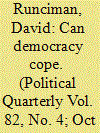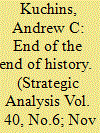| Srl | Item |
| 1 |
ID:
108311


|
|
|
|
|
| Publication |
2011.
|
| Summary/Abstract |
The success story of democracy over the twentieth century has given way to doubts in the twenty-first, as democracies struggle to cope with difficult wars, mounting debts, climate change and the rise of China. This essay uses intellectual history to explain the link between long-term democratic success and short-term democratic failure. It distinguishes three distinct views of what can go wrong with democracy, and identifies the third (which I call 'the confidence trap', an idea that originates with Tocqueville) as the key to understanding our present predicament. Democratic success creates blind spots and a reluctance to tackle long-term problems. I use this idea to explain and put in context Fukuyama's claims about the end of history, and to examine the link between democratic failure and market failure.
|
|
|
|
|
|
|
|
|
|
|
|
|
|
|
|
| 2 |
ID:
148713


|
|
|
|
|
| Summary/Abstract |
On December 25 of this year we will mark 25 years since the collapse of the Soviet Union. Many in Russia and the West were optimistic about the seeming imminent integration of Russia into a Western-led liberal democratic global order. The United States, in particular, fresh off its ‘victory’ in the Cold War, could hardly restrain its triumphalism as it stood astride the world as the sole superpower. As the 1990s came to a close, US power and dominance seemed only further augmented as the dot.com boom fuelled economic and technological growth of historic proportions while Russia had endured a decade of massive economic dislocation. Leading US international relations scholars crowed about the ‘durability of a unipolar order’ in 2000 precisely at the moment when the worm began to turn as the boom turned to bust and the United States embarked on a foolish and unnecessary war in Iraq that has cost the country mightily in blood, treasure, and international credibility and reputation.
|
|
|
|
|
|
|
|
|
|
|
|
|
|
|
|
| 3 |
ID:
158267


|
|
|
|
|
| Summary/Abstract |
In post-Mao China, a group of Chinese intellectuals who formed what became the New Left (新左派) sought to renew socialism in China in a context of globalization and the rise of social inequalities they associated with neo-liberalism. As they saw it, China’s market reform and opening to the world had not brought greater equality and prosperity for all Chinese citizens. As part of China Information’s research dialogue on the intellectual public sphere in China, this article provides a historical survey of the development of the contemporary Chinese New Left, exploring the range of ideas that characterized this intellectual movement. It takes as its focus four of the most prominent New Left figures and their positions in the ongoing debate about China’s future: Wang Shaoguang, Cui Zhiyuan, Wang Hui, and Gan Yang.
|
|
|
|
|
|
|
|
|
|
|
|
|
|
|
|